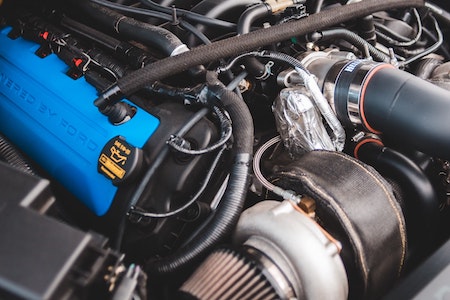The question is often asked, searched, and answered, all over the internet. I found such a variety of answers that researching this subject was very difficult and confusing. This is no simple topic since there are many factors to take into account and some engineering involved, but because it was difficult for me to find simple things such as the chemical structure and density of diesel fuel, I have included those things here and do my best to use my engineering skills to take the complicated combustion of diesel fuel and explain it basically.
Let’s start with the 2 big questions here that are commonly asked and almost just as commonly answered in a variety of ways.
Is burning diesel fuel more efficient than burning gasoline?
Diesel burns 12.6% more efficiently than gasoline not taking into account different engine designs and other factors. Diesel engines are compression engines as opposed to a gasoline engine which is a spark ignition engine. The higher compression adds to the slightly better overall diesel efficiency.
Looking at purely diesel fuel vs gasoline fuel burning, diesel releases 138.4 Megajoules of energy per gallon upon combustion. Gasoline releases 122.9 Megajoules per gallon upon combustion.
I back these numbers up with my calculations performed to reach these numbers. Read more here how to calculate energy released from the combustion of diesel vs gasoline
Does diesel burn cooler than gasoline?
When the same amount of diesel and gasoline are burned and compared side-by-side, diesel releases more energy therefore the temperature at ignition is higher with diesel. Despite this, Diesel engines naturally burn cooler than gasoline engines due to two things. 1. The air/fuel ratio for diesel is much higher than that of gasoline. With less fuel, the combustion temperature will be lower. 2. Higher compression in diesel engines promotes higher thermal efficiency.
The calculation for this follows..
In my personal quest to find these answers and determine answers that seem to be highly debated in forums, I could not find anywhere that backed up their numbers with evidence of how their numbers were calculated. Here is how I calculated the energy released by diesel compared to gasoline to determine the energy efficiency difference:
How Much Energy is Released from Burning Diesel vs Gasoline
As I was diving in to learn more about gasoline vs diesel, all I knew previous to my own research is that diesel is superior because it is more fuel efficient and provides the engine with more torque!
Well after doing my own research I have found that these things can be true, but what I found out is WHY.
Here is why diesel burns more “efficiently” than gasoline.
Diesel burns more efficiently than gasoline for two main reasons: 1. Diesel produces more energy per volume combusted. 2. When combusted in the engine, diesel engines run leaner and at a higher compression ratio both of which allow diesel engines to work more efficiently.
Combustion Energy Calculation
Chemical formula for Diesel and Gasoline
Both of these fuels are a mixture of hydrocarbons and have a slew of additives in them. Because gasoline is mostly octane, octane for energy calculations is close enough. For diesel fuel which is made up of a wider variety of compounds, an average must be used. This is the reason diesel is not a standard molecular compound.
The primary compound in gasoline is octane which is C8H18. Determining the molecular compound of diesel is not as straight forward, but a widely used formula is C12H23 which is a good average of all the hydrocarbons that are in the diesel mixture.
Another characteristic of the fuel that needed to be averaged was the density. For my calculations I used a density of 0.85 kg/L for diesel and 0.725kg/L for gasoline. I used the densities of gasoline and diesel from this article in the Science Direct scientific journal article about diesel fuel.
Energy Released from the Combustion of Diesel
138.4 Megajoules are released upon combustion of 1 gallon of diesel fuel
Energy Released from the Combustion of Gasoline
122.9 Megajoules are released upon combustion of 1 gallon of gasoline
The difference in energy released per volume is 12.6% more energy released from diesel compared to gasoline.
This answers our question,
Does diesel burn better than gas?
Diesel burns better and is more efficient than gas because it produces more energy per volume of fuel consumed. Diesel produces 12.6% more energy than gas per volume.
Cooler Diesel Engine Temperatures than Gasoline
Why do diesel engines run cooler than gasoline engines?
Anyone who owns a diesel knows that they have a tougher time warming up. A lot of diesels will not warm up by sitting idling but need to be driven.
A common answer to this is that they burn more efficiently generating less heat, but clearly per volume of fuel, diesel burns hotter than gasoline so the answer must be the diesel engine uses less fuel. Which is correct!
Leaner Air/Fuel Mixtures in Diesel Engines Decreases the Temperature
How can diesels run cooler than gas engines?
Diesel engines run cooler than gasoline engines at low rpm because they use less fuel at low rpm. Diesel engines run very lean at idle and low throttle and a lean engine runs cooler because of the excess unburned air. At high rpm diesel engines run just as hot as a gasoline engine.
An engine will run its hottest at the optimal fuel/air ratio. When the engine is running at the perfect ratio, no fuel or oxygen is left over. This never happens perfectly but it would get the closest at the optimal fuel ratio.
The optimal diesel ratio is about 14.5:1 and the optimal gasoline fuel/air ratio is about 14.7:1.
The difference in diesel engines is that there is no throttle restricting the air intake. Only the amount of fuel is increased. So at low throttle, very little fuel is used running at a ratio of more like 60:1.
Compression Ratio of Diesel Engines are Higher/More Efficient
To be fair there is another factor that contributes to the cooler running of a diesel engine. That is the thermal efficiency of a diesel engine is higher than that of a gasoline engine. A diesel engine is more thermally efficient because it has a much higher compression ratio.
More energy is generated in the combustion of diesel, but that energy is converted into work on the system (i.e. turning the engine) and heat. A higher compression ratio brings up the temperature of the fuel/air and burns closer to operating temperature losing less to heat.
Diesel engines tend to have much higher compression ratios than gasoline engines.
First, what is the compression ratio?
The compression ratio is the ratio of the maximum volume of air in a cylinder compared to the minimum volume of air in the cylinder at combustion. This indicates how much the air/fuel are compressed.
Diesel engines generally run a compression ratio between and 14:1 and 25:1 and gasoline engines have a compression ratio usually between 8:1 and 12:1. Almost always below 12:1 to prevent pre-detonation or “knocking”.
Diesel is a more stable fuel than gasoline and can handle higher pressures. For this reason diesel engines run at a much higher compression and even depend on the intense pressures to increase the temperature and ignite the diesel fuel.

Normal Temperature of a Diesel Engine
Operating/ Coolant Temperature
A thermostat is included in the engine cooling system and the thermostat allows for engine coolant to flow through the engine at a certain temperature. This prevents the coolant from cooling the engine when it is not needed which would prevent the engine from warming up and the engine operates more efficiently when warm.
For this reason the “operating temperature” of an engine is most often taken at the coolant level.
Here we’ll take a look a the normal coolant temperatures for a diesel engine.
After gathering feedback from more than 30 diesel truck owners, I have enough feedback to provide you with some good average numbers for coolant temperatures of a diesel.
I also spent a significant amount of time looking up specs for different vehicles to determine thermostat temperatures etc.
Diesel engine idle cooler than gasoline engines and operate efficiently at a slightly lower temperature than gas engines, but once running reach the same temperatures and due to the nature of the use of diesel engines for pulling large loads, can reach very high operating temperatures.
What should the Coolant Temperature be for a diesel?
A diesel engine should operate at near the same temperature as a gasoline engine. Coolant temperatures in the range of 180-210 degrees Fahrenheit are normal. It is also normal to see temperatures rise to as high as 225 degrees Fahrenheit. Temperatures above 230 degrees at the coolant is a problem.
My temperature gauge seems high on my diesel truck. Is it normal?
A diesel engine should run under no load steady at about 200 degrees Fahrenheit. This is very normal and ideal. When an engine is working hard pulling a load such as a heavy trailer, temperatures can get up to 230 degrees Fahrenheit. This is still not of concern as long as the temperatures do not get above that.
There is nothing to be concerned but you should keep an eye on the thermostat if it reaches 215 degrees. A this point the thermostat is most likely fully open. If the temperature rises above 230 degrees in your diesel, that is not normal and the cooling systems and oil and engine should be inspected.
I constructed this table to act as a guidance aid for your concern level and any action that needs to be taken based on the diesel engine temperatures:
Temperature Range vs Action Table
| Temperature Range (Degrees Fahrenheit) | Car Behavior | Action You Should Take |
| Below 190 | Warming Up | Warm up the engine (Don’t just idle) |
| 190 | Thermostat Begins to Open | Just keep driving |
| 190 – 215 | Water is cooling the engine | Just keep driving |
| 215 | Thermostat is Fully Open | Just keep driving |
| 215-230 | Engine is hot and working hard | Continue driving but take it easy |
| Above 230 | Engine in danger of overheating | Take action to cool the engine |
I gathered the thermostat temperatures used here in the chart indicating when the thermostat is beginning to open and when it is fully open from the Ford manual for a 6.0L Powerstroke 1999-2007 Ford Superduty
Since Ford trucks are one of the most popular trucks in America, this seems like a fair average to use.
Please do be aware that I have taken these temperatures as an average and there are a LOT of different diesel engines out there that operate very differently.
Your best bet is to look in the car manual for YOUR car to see when the thermostat is set to open and what operating temperature is normal when driving your diesel.
I have seen temperatures around 220 with a small trailer and when towing a big load it is normal to get up close to 230 degrees. 230 degrees is the temperature that I chose to take action to allow my truck to cool if it gets above that temp. Before that point I take action like turning off the AC and not stomping on the gas pedal so hard, but 230 is that scary spot where you are getting close to potential permanent damage.
Again all of these temperatures referencing the temperature at the coolant.
Oil Temperature of a diesel Engine
The operating temperature of a diesel engine is very near that of a gasoline engine. A diesel engine generally runs about 10 degrees cooler than a gasoline engine at idle and low speed but operates in the same temperature range once warm. Diesels operates slightly cooler at low speed because diesels run very lean at low speed.
The coolant in an engine should stay about 10 degrees cooler than the engine oil. Or, a better way to say it would be: The engine oil should not be higher than about 10 degrees hotter than the coolant temperature.
Oil temperatures in a diesel engine get up to the same temperature range as a gasoline engine.
Generally the engine oil should not be more than 10 degrees hotter than the coolant temp so if you monitor both of those that is a great way to keep an eye on the car to keep it from overheating.
Oil temperatures in a diesel engine can get up to 240 degrees. Beyond 240 degrees Fahrenheit and action should be taken quickly to cool the engine.
Ignition Temperature
The ignition temperature of diesel fuel is higher than that of gasoline.
This is backed by my calculation of the amount of energy released from the combustion of diesel vs gasoline.
At the point of ignition more energy is released when diesel is burned than when the same amount of gasoline is burned.
Now, diesel engines are designed in such a fashion that the air intake is not restricted at idle and low speeds like it is in a gasoline engine. So, when comparing the two fuels in two different engines, the act differently and produce different temperatures. Diesel engines run cooler than gasoline engines simply because they run much leaner at low throttle.
If the same amount of gasoline and diesel fuel were burned and compared then diesel would burn hotter that gasoline by 12.6% which is how much more energy diesel releases than gasoline per volume.


